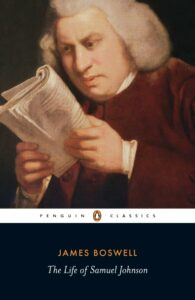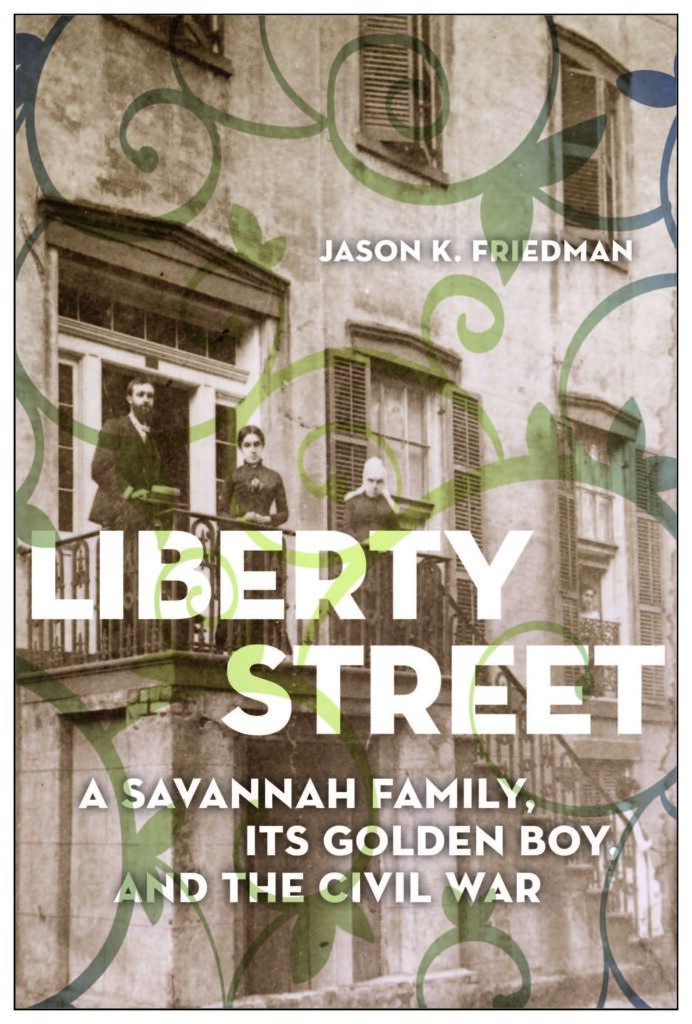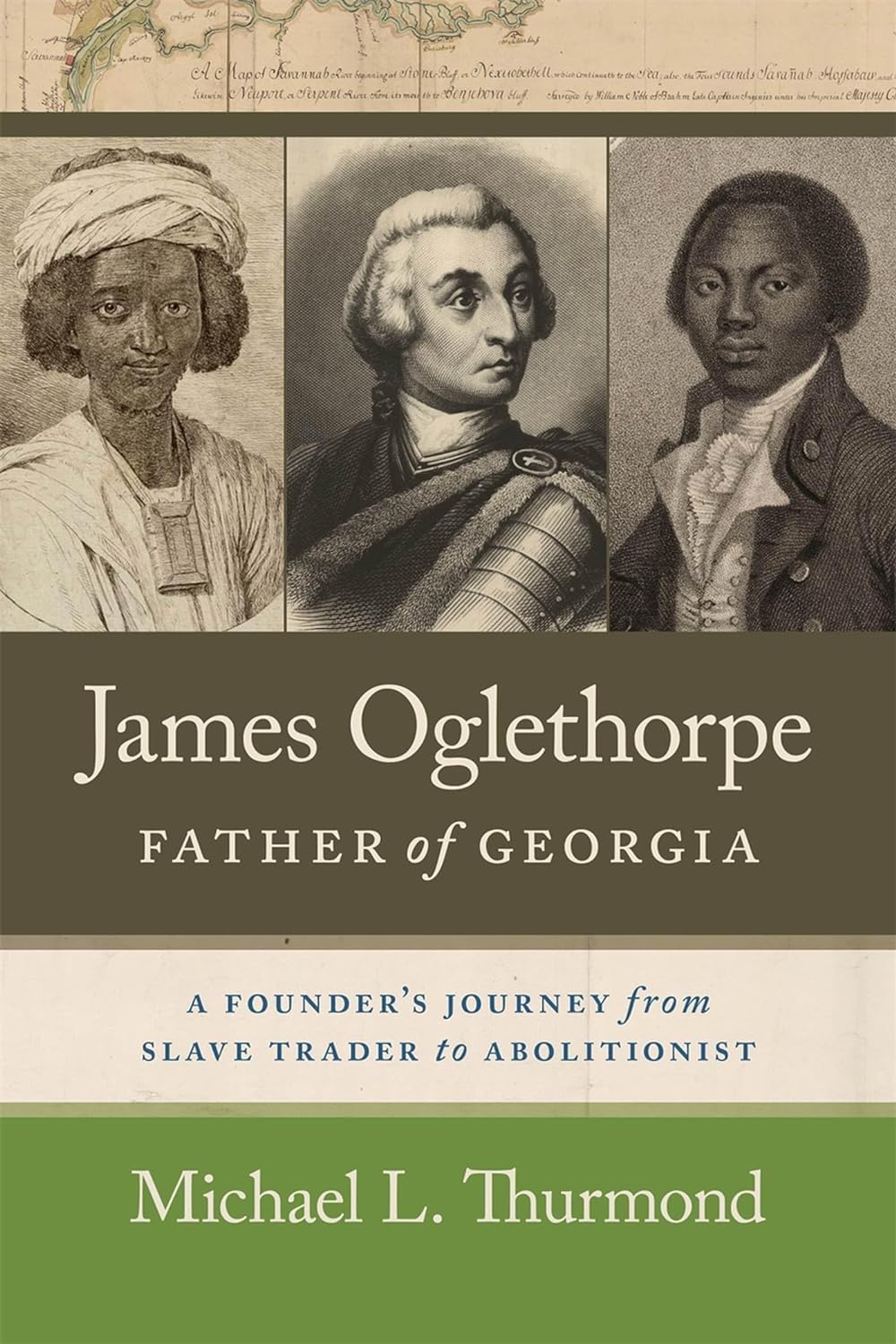 On Monday, May 16, 1763, 261 years ago this week, young James Boswell was introduced to Samuel Johnson at Thomas Davies’s bookshop on Russell Street, near Covent Garden in London. Boswell was a 22-year-old Scotsman, perhaps best described as what we’d today call a “social influencer”—he wanted to be famous, and he was hugely ambitious. Johnson was 53, an already-acclaimed writer and author that Boswell desperately wanted to meet. Boswell famously described their meeting years later: Boswell went to his friend Davies’s bookstore for afternoon tea, and in walked Johnson. Introducing the two, and knowing the grumpy Johnson’s dislike of the Scots, Davies playfully revealed Boswell’s nationality. Boswell blurted out, ““Mr. Johnson, I do indeed come from Scotland, but I cannot help it.” Johnson’s riposte: “That, Sir, I find, is what a very great many of your countrymen cannot help.” Such was the beginning of one of the most famous—if bumpy—friendships in all of literature.
On Monday, May 16, 1763, 261 years ago this week, young James Boswell was introduced to Samuel Johnson at Thomas Davies’s bookshop on Russell Street, near Covent Garden in London. Boswell was a 22-year-old Scotsman, perhaps best described as what we’d today call a “social influencer”—he wanted to be famous, and he was hugely ambitious. Johnson was 53, an already-acclaimed writer and author that Boswell desperately wanted to meet. Boswell famously described their meeting years later: Boswell went to his friend Davies’s bookstore for afternoon tea, and in walked Johnson. Introducing the two, and knowing the grumpy Johnson’s dislike of the Scots, Davies playfully revealed Boswell’s nationality. Boswell blurted out, ““Mr. Johnson, I do indeed come from Scotland, but I cannot help it.” Johnson’s riposte: “That, Sir, I find, is what a very great many of your countrymen cannot help.” Such was the beginning of one of the most famous—if bumpy—friendships in all of literature.
I wrote about Boswell in another blog entry from December 10, 2014, nearly 10 years ago, and on this auspicious anniversary of that famous meeting, I can do no better than to quote a bit from that post (with slight editing) again here:
“I am lost without my Boswell.” So says Sherlock Holmes about Dr. Watson in “A Scandal in Bohemia.” Boswell is most famous as the author of the monumental biography, The Life of Samuel Johnson, first published in 1791 and never out of print. I bought a nice Easton Press edition in three volumes a few years back and loved it. Boswell is best known as Johnson’s biographer, but he was a fascinating and complex man in his own right, well worthy of our attention, and his published journals are just the place to start.
Boswell would be well at home in today’s world of social media. He kept extensive journals throughout his life, covering the most intimate details of his private goings-on and detailed transcriptions of his conversations with the great men and women of 18th-century Britain, including Georgia’s founder James Edward Oglethorpe, Samuel Johnson of course, the artist Joshua Reynolds, actor David Garrick, writer Oliver Goldsmith, the aforementioned David Hume, Voltaire, and many, many others.
And just like today’s most avaricious social media posters, he held nothing back, even when he probably should have. He wrote about everything: politics, art, literature, court intrigues, his sexual and sensual escapades (including cavorting with London’s prostitutes and contracting and living with an STD), the peccadilloes of his friends and associates, falling out with his father over his chosen career, his fear of ghosts, and everything else you can imagine. He was an inveterate sinner who feared damnation but would walk out of a church and have sex with a prostitute. Sometimes he would miss the sermon because he was lusting over a woman in another pew. It is about as revealing a snapshot of everyday life in 18th-century Britain—and a man driven by and forever at war with his passions—as we are ever likely to have, and it is all fascinating, a ripping good read.
Boswell died in 1795 at age 54, leaving behind a wealth of personal papers and journals that he hoped would one day be published. His family, however, had other ideas. Generations of his descendants thought his writings inappropriate and scandalous, detailing as they did his every whim, fancy, and indiscretion. They were also ashamed of their association with a man whom they considered to have lowered himself by acting the sycophant to the overbearing and boorish Johnson simply to obtain material for his biography.
Boswell’s descendants didn’t exactly lose his writings, but it’s safe to say they put them away and mostly forgot about them as they passed from generation to generation. They were “rediscovered” in the 1920s and 1930s in a croquet box at Malahide Castle in Ireland and in a stable loft at the home of a Scottish laird at Fettercairn House near Aberdeen.
The story of the Boswell Papers’ disappearance and re-discovery is told in fascinating if sometimes excruciating details in Frederick Pottle’s Pride and Negligence: The History of the Boswell Papers (1981) and in David Buchanan’s more enthralling The Treasures of Auchinleck: The Story of the Boswell Papers (1974). Pottle was a lifelong Boswell scholar and edited, in the “Boswell Factory” at Yale, all but one of the thirteen volumes of the popularly published journals that begin with the London Journal.
When Boswell’s London Journal, 1762-1763, was first published in 1950, it was a surprising best seller and one can see why. It’s racy and titillating, gossipy and erudite, introspective and philosophical, witty and just plain fun. There are two famous scenes in these pages: Bozzy’s first meeting with Johnson on May 19, 1763, of course, but also the memorable day when he confronts his girlfriend Louisa as to whether she knowingly gave him a venereal disease: “Madam, I have had no connection with any woman but you these two months. I was with my surgeon this morning, who declared I had got a strong infection, and that she from whom I had it could not be ignorant of it. Madam, such a thing in this case is worse than from a woman of the town, as from her you may expect it. You have used me very ill. I did not deserve it.” Louisa protested her innocence, but to no avail. Boswell stormed out and ended the relationship. Later in a quieter moment he confessed to his journal that he’d had this same disease twice before, but if he ever apologized to poor Louisa, the journal is silent.
Boswell kept on writing till his last days, and though his father scolded him for keeping “a register of his follies and communicat[ing] it to others as if proud of them,” we are the ultimate beneficiaries. There are twelve other volumes after this one and I look forward to reading them all.
***
With the publication of Boswell’s Journals, the perception of the famous friendship has begun to change: Boswell has come into his own as one of the great historical figures of the 18th century, a flawed genius that, for many people, now eclipses Johnson’s brilliance. In Clifton Fadiman’s words, “the disciple is beginning to overshadow the master.” Boswell, he rightly insisted, “is more than a superb reporter. He is an artist, just as surely as Rembrandt.”
The literature on Boswell, Johnson, and their famous friendship is vast, but start, as mentioned above, with the London Journal, then read as many of the other Journals as you desire. I’ve since read six volumes now, with seven more to go. They never disappoint. And of course, read Boswell’s Life of Johnson, which critic Michael Dirda called “the greatest of all biographies and probably the most entertaining book in English literature.”
 But you don’t have to stop there. In addition to the Pottle and Buchanan books cited above, I recommend the following: Frederick Pottle, James Boswell: The Earlier Years, 1740-1769 (1966); W. Jackson Bate, Samuel Johnson (1977, winner of the 1978 Pulitzer Prize for Biography); Frank Brady, James Boswell: The Later Years, 1769-1795 (1984); Peter Martin, A Life of James Boswell (2000); Liza Picard, Dr. Johnson’s London (2001); Adam Sisman, Boswell’s Presumptuous Task: The Making of the Life of Dr. Johnson (2001) Peter Martin, Samuel Johnson: A Biography (2008); John B. Radner, Johnson and Boswell: A Biography of Friendship (2013); and Leo Damrosch, The Club: Johnson, Boswell, and the Friends Who Shaped An Age (2020).
But you don’t have to stop there. In addition to the Pottle and Buchanan books cited above, I recommend the following: Frederick Pottle, James Boswell: The Earlier Years, 1740-1769 (1966); W. Jackson Bate, Samuel Johnson (1977, winner of the 1978 Pulitzer Prize for Biography); Frank Brady, James Boswell: The Later Years, 1769-1795 (1984); Peter Martin, A Life of James Boswell (2000); Liza Picard, Dr. Johnson’s London (2001); Adam Sisman, Boswell’s Presumptuous Task: The Making of the Life of Dr. Johnson (2001) Peter Martin, Samuel Johnson: A Biography (2008); John B. Radner, Johnson and Boswell: A Biography of Friendship (2013); and Leo Damrosch, The Club: Johnson, Boswell, and the Friends Who Shaped An Age (2020).
As for the date of that famous meeting, Boswell missed dying on the anniversary itself by three days—32 years later—on May 19, 1795. He is buried in the family vault at Auchinleck Old Churchyard in Auchinleck, Scotland. Johnson died on December 13, 1784, at age 75, and is buried in Westminster Abbey.
But how’s this for coincidence? Frederick Pottle, the man who spent nearly his entire professional career as the editor and biographer of Boswell and his papers, considered the greatest Boswell scholar of all, himself died on the anniversary of that famous meeting, on May 16, 1987, at age 89. I suspect that would have pleased Dr. Pottle very much. No Westminster Abbey for him: Pottle is buried, appropriately, at Elmwood Cemetery in quiet Otisfield, Maine.
Alas, the Boswell Papers Project at Yale that Pottle captained for so long is no more, unceremoniously shut down by Yale bean counters during the pandemic. But the great friendship that began on that long-ago Monday in a London bookstore lives on for all of us to discover and explore, not only through print but now also on numerous social media pages and forums, dedicated to every aspect of Boswell, his life, and his world, in all his wickedness and glory—which he most assuredly would have loved.
Savannah, May 16, 2024



 On Monday, May 16, 1763, 261 years ago this week, young James Boswell was introduced to Samuel Johnson at Thomas Davies’s bookshop on Russell Street, near Covent Garden in London. Boswell was a 22-year-old Scotsman, perhaps best described as what we’d today call a “social influencer”—he wanted to be famous, and he was hugely ambitious. Johnson was 53, an already-acclaimed writer and author that Boswell desperately wanted to meet. Boswell famously described their meeting years later: Boswell went to his friend Davies’s bookstore for afternoon tea, and in walked Johnson. Introducing the two, and knowing the grumpy Johnson’s dislike of the Scots, Davies playfully revealed Boswell’s nationality. Boswell blurted out, ““Mr. Johnson, I do indeed come from Scotland, but I cannot help it.” Johnson’s riposte: “That, Sir, I find, is what a very great many of your countrymen cannot help.” Such was the beginning of one of the most famous—if bumpy—friendships in all of literature.
On Monday, May 16, 1763, 261 years ago this week, young James Boswell was introduced to Samuel Johnson at Thomas Davies’s bookshop on Russell Street, near Covent Garden in London. Boswell was a 22-year-old Scotsman, perhaps best described as what we’d today call a “social influencer”—he wanted to be famous, and he was hugely ambitious. Johnson was 53, an already-acclaimed writer and author that Boswell desperately wanted to meet. Boswell famously described their meeting years later: Boswell went to his friend Davies’s bookstore for afternoon tea, and in walked Johnson. Introducing the two, and knowing the grumpy Johnson’s dislike of the Scots, Davies playfully revealed Boswell’s nationality. Boswell blurted out, ““Mr. Johnson, I do indeed come from Scotland, but I cannot help it.” Johnson’s riposte: “That, Sir, I find, is what a very great many of your countrymen cannot help.” Such was the beginning of one of the most famous—if bumpy—friendships in all of literature. But you don’t have to stop there. In addition to the Pottle and Buchanan books cited above, I recommend the following: Frederick Pottle,
But you don’t have to stop there. In addition to the Pottle and Buchanan books cited above, I recommend the following: Frederick Pottle, 